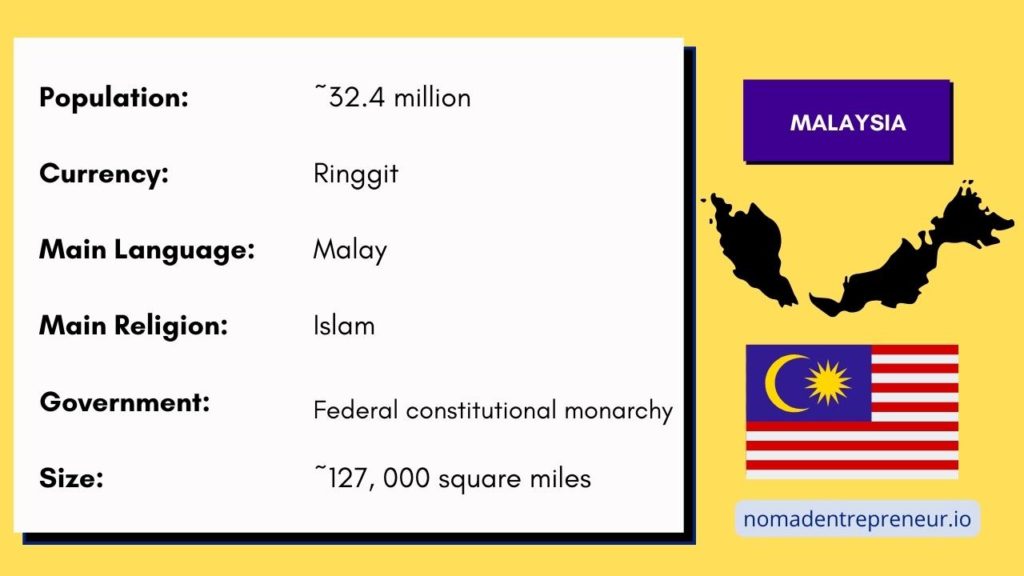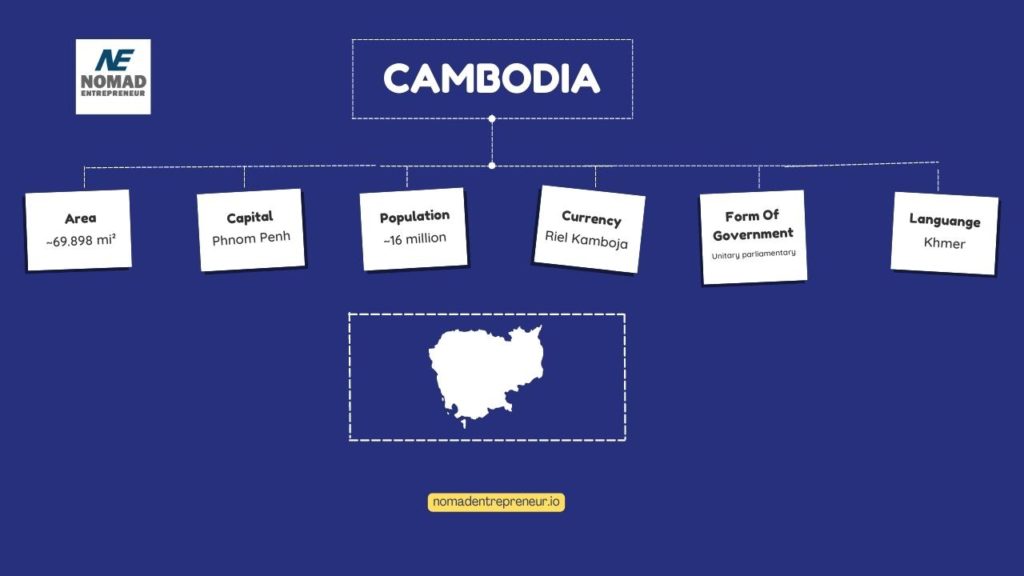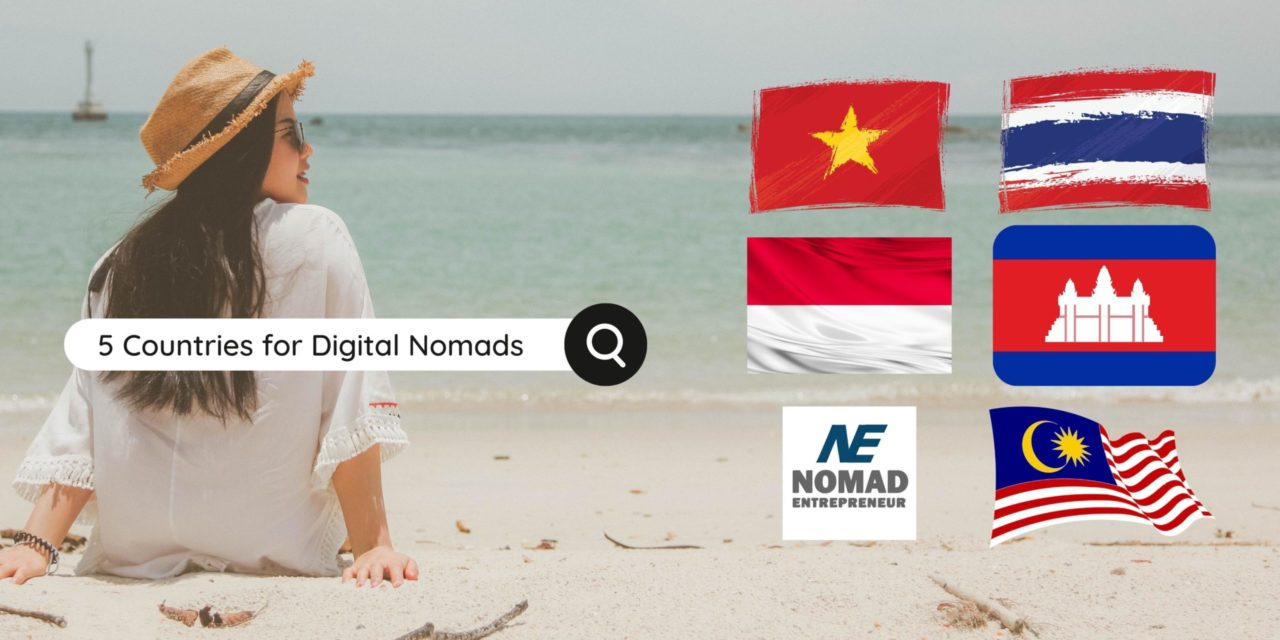If you’re looking for cheap destinations for digital nomads in Asia, you’re lucky. This region is home to some of the best and most affordable places in the world to set up an online store or work online. But with so many options available, it can be tough to decide which country is right for you. In this article, we’ll take a look at five popular countries for digital nomads in Asia, and explore the pros and cons of each one. So whether you’re just starting your research or you’re ready to make a decision, read on for help finding the perfect place to call home base as a digital nomad in Asia!
Do cheap destinations for digital nomads in Asia exist?
Absolutely! In fact, there are several cheap destinations for digital nomads.
Vietnam for digital nomads
Vietnam is a great cheap destination for digital nomads. It’s possible to live very well on around $500 per month, and internet speeds are fast and reliable. The country also offers several visas specifically for digital nomads, including the 12-month work permit visa. However, the nightlife isn’t as vibrant in Vietnam as in some other countries, and it can be difficult to meet other digital nomads.
Is Vietnam a safe country for digital nomads?
Vietnam is a safe country for digital nomads. While petty crime does occur, it’s rare and typically doesn’t involve foreigners. Vietnam is also a relatively law-abiding country, and the police are usually helpful and willing to assist foreigners in need. That said, it’s always important to take precautions when traveling in any new place, so be sure to familiarize yourself with common scams and safety tips for Vietnam.
Where do digital nomads stay in Vietnam?
When traveling as a digital nomad in Vietnam, it’s important to find a place to stay that offers fast and reliable internet. Fortunately, many great hostels fit the bill. The Hideout Hostel in Ho Chi Minh City, for example, offers free high-speed wifi, as well as some other amenities like a communal kitchen and laundry facilities. Another cheap hostel in Ho chi Minh is Budget Hostel. if you’re looking for something a little bit more luxurious, the Mad Monkey Hostel in Hanoi features private ensuite bathrooms and an on-site bar.
So whether you’re just starting your travels in Vietnam or you’re looking for a new place to stay, be sure to check out these great hostels for digital nomads!
Coworking spaces in Vietnam
As a digital nomad, finding a great coworking space is essential. Not only do they offer fast and reliable internet, but they also provide a great place to meet other like-minded professionals and get work done.
In Vietnam, there are several great coworking spaces to choose from. In Ho Chi Minh City, for example, you can check out the Dreamplex’s Chi Minh City, which offers access to high-speed wifi and a range of other amenities like meeting rooms and event spaces. And in Hanoi, the The Learning Hub Hanoi building is a popular choice, with private offices, shared desks, and conference rooms available for rent.
So whether you’re just starting your travels in Vietnam or you’re looking for a new place to work, be sure to check out these great coworking spaces!
Cost of living in Vietnam
The cost of living in Vietnam is relatively cheap. You can easily live on $500 per month, and even less if you’re willing to sacrifice some comfort. Necessities like food, transportation, and accommodation are all affordable, and you can find good deals on both local and international cuisine. That said, Vietnam is a developing country, so there are some areas where costs are higher than average. For example, healthcare and education can be expensive, so it’s important to do your research before moving to Vietnam.
Can a foreigner open a bank account in Vietnam?
In Vietnam, a foreigner can open a bank account. However, you’ll need to provide many documents including your passport and visa. You’ll also need to have an address in Vietnam, either your home address or the address of your chosen coworking space.
Once you’ve opened your bank account, you can easily transfer money in and out of Vietnam. And if you need to exchange currency, most banks offer competitive rates. So whether you’re just starting your travels in Vietnam or you’re looking for a new place to keep your money, make sure to open a bank account!

Thailand for digital nomads
Thailand has long been a popular destination for digital nomads, and it’s easy to see why. With its stunning beaches, cheap cost of living, and vibrant nightlife scene, Thailand has a lot to offer. The country also has good internet speeds and a number of digital nomad visas available. However, it’s important to note that Thailand can be quite dangerous, especially for solo female travelers.
There are some great places for digital nomads in Thailand. Some of the most popular destinations include Bangkok, Chiang Mai, and Koh Samui.
Bangkok is a great option for digital nomads who want to be in the heart of the action. The city is home to a lively nightlife scene, and there are plenty of coworking spaces and cafes to getting work done. However, Bangkok can be quite expensive, and it’s not always the safest place to live.
Chiang Mai is a more affordable alternative to Bangkok, and it’s also a great place for digital nomads who want to get out into nature. The city has an active digital nomad community. It’s also much safer than Bangkok.
Koh Samui is another great option for digital nomads looking for a bit of beach time. The island has a range of cheap accommodation options, and the beaches are beautiful. However, Koh Samui can be quite touristy, and the internet speeds can be slow.
Cost of living in Thailand
The cost of living in Thailand varies depending on the city you’re in. Bangkok is the most expensive city in Thailand, and Chiang Mai is the most affordable.
In Bangkok, you can expect to pay around USD 1,000 per month for a comfortable lifestyle. This includes rent, food, transportation, and utilities. Chiang Mai is much more affordable, with costs averaging around $500 per month.
Accommodation is one of the biggest expenses when living in Thailand. Rent prices vary greatly depending on the city and the quality of the accommodation. In Bangkok, you can expect to pay anywhere from $200 to $1,000 per month for a room or apartment. In Chiang Mai, rent prices are much more affordable, with most places costing between $100 and $200 per month.
Food is also relatively cheap in Thailand. You can get a meal for as little as $3 in many parts of the country. However, eating out can be quite expensive in Bangkok.
Transportation is cheap in Thailand, with a single journey costing around 20 cents. However, taxis can be quite expensive, especially in Bangkok. Utilities such as water, electricity, and internet cost around $50 per month.
The cost of living in Thailand is quite cheap, especially when compared to Western countries. However, it’s important to note that the cost of living can vary greatly depending on the city you’re in.
Thailand Visas for digital nomads
Thailand offers some visas for digital nomads, including the Non-Immigrant B visa and the Elite Visa.
The Non-Immigrant B visa is valid for one year and allows digital nomads to live and work in Thailand. The visa can be renewed annually, and there is no minimum income requirement.
The Elite Visa is a long-term residency visa that gives holders access to a range of benefits, including healthcare and tax exemption. The Elite Visa is valid for five years and can be renewed. There is no minimum income requirement for this visa.
Nightlife in Thailand
Thailand has a vibrant nightlife scene, with something to offer everyone. Bangkok is home to several nightclubs, bars, and restaurants, while Chiang Mai has a more laid-back atmosphere. Koh Samui also has a lively nightlife scene, with many beach bars and clubs.
Internet speeds in Thailand
The internet speeds in Thailand are quite good, especially in the cities. However, there can be some areas where the internet is slow.
Safety in Thailand
Thailand is generally safe for travelers. However, it’s important to note that there are some areas of the country that are more dangerous than others. Bangkok is relatively safe, but there have been reports of crime in some areas. Chiang Mai is also safe, but there have been reports of petty crime, such as pickpocketing and bag snatchings. Koh Samui is generally safe, but there have been reports of muggings and robberies. Overall, Thailand is a safe country to travel to, but it’s important to be aware of the risks before you go.

Indonesia for digital nomads
Indonesia is another cheap destination for digital nomads, with many people living on around $500 per month. The country has good internet speeds and several co-working spaces, making it easy to stay connected and productive. However, the nightlife scene isn’t as developed as in some other countries, and safety can be an issue in certain areas.
Indonesia Visas for digital nomads
Indonesia offers several digital nomad visas, including the 12-month work permit visa, the 30-day visa exemption, and the 60-day social visit visa. The 12-month work permit visa is the most popular option for digital nomads, as it allows you to stay in Indonesia for up to 12 months and offers some benefits, including the ability to work legally and extend your stay. To be eligible for the 12-month work permit visa, you must be a foreign national and have a valid passport. You must also have a sponsor in Indonesia who can provide you with a letter of invitation.
Bali – The holy land for digital nomads
The Indonesian island Bali is often referred to as the “Vatican” for digital nomads, and it’s easy to see why. With its cheap cost of living, beautiful beaches, and abundance of coworking spaces and cafes, Bali has everything you need to live and work comfortably as a digital nomad. However, it’s important to note that Bali can be quite crowded, and internet speeds can be slow in some areas.
Digital nomads in Bali will never be bored. There are many activities to keep you busy on the island, including surfing, snorkeling, and diving. Bali is also home to a vibrant nightlife scene, with plenty of bars and clubs to keep you entertained.
Cost of living in Bali
The cost of living in Bali is relatively cheap, with most people living on around $500 per month. However, it’s important to note that the cost of living can vary depending on your lifestyle and where you live on the island.
Accommodation is one of the biggest expenses in Bali, with rent prices ranging from $50 to $250 per month. If you’re looking for cheap accommodation, you can find a room in a shared house or villa, or rent a room in a local family’s home.
Food is another major expense, with groceries and restaurant meals costing between $5 and $20 per day. If you’re looking to save money, you can buy groceries from local markets and cook your meals.
Transportation is also relatively cheap in Bali, with taxis and scooters costing between $0.50 and $1 per kilometer.
Internet speeds in Bali
Internet speeds in Bali are generally good, with most places having access to speeds of at least 20 Mbps. However, it’s important to note that internet speeds can vary depending on where you live and work on the island.
Safety for digital nomads in Bali
Bali is generally a safe place for digital nomads, but some areas are safer than others. The southern part of the island is generally considered to be the safest, as it’s home to most of the tourist attractions and has a higher police presence. The northern part of the island is less developed and can be more dangerous. It’s important to take precautions when traveling in Bali, such as avoiding walking alone at night and holding onto your belongings in crowded areas.

Malaysia for digital nomads
Malaysia is a great cheap destination for digital nomads who are looking for good internet speeds and a developed nightlife scene. The country has a number of co-working spaces and a growing community of digital nomads. You can easily get by on $600 per month, making Malaysia one of the more affordable countries in the region. However, it’s important to note that Malaysia is a Muslim country, so alcohol is not widely available and pork is not served in many restaurants.
That said, there are plenty of great places to work and live in Malaysia. Some of the most popular destinations for digital nomads include Kuala Lumpur, Penang, and Johor Bahru.
Kuala Lumpur is the capital city of Malaysia and home to a vibrant nightlife scene and many co-working spaces. The cost of living is relatively cheap, and you can easily get by on $800 per month. However, Kuala Lumpur can be quite congested and it’s not always the safest place to live.
Penang is another great option for digital nomads in Malaysia. The city has a large number of co-working spaces and a lively nightlife scene. It’s also much cheaper than Kuala Lumpur, with a cost of living of around $600 per month. However, the internet speeds can be quite slow and the city can be quite dangerous at night.
Johor Bahru is the capital of the Malaysian state of Johor and home to some co-working spaces. The city is also cheap, with a cost of living of around $700 per month. However, it’s important to note that Johor Bahru is not always the safest place to live.
Coworking spaces in Malaysia
There are many great coworking spaces in Malaysia, including the following:
– The Settlements Penang: This space is located in the heart of Georgetown and offers some different membership plans, including a day pass. The Settlements Penang has several great amenities, including high-speed internet, coffee, and tea.
– Common Ground Johor Bahru: This space is located in the heart of Johor Bahru and offers several different membership plans, including a day pass. Common Ground Johor Bahru has a number of great amenities, including high-speed internet, coffee, and tea.
– The Colony Coworking Space in Kuala Lumpur: This space is located in the heart of Kuala Lumpur and offers some different membership plans, including a day pass. KLCC Kuala Lumpur has a number of great amenities, including high-speed internet, coffee, and tea.
Can a foreigner open a bank account in Malaysia
A foreigner can open a bank account in Malaysia, but there are a few things you need to know before you get started. To open a bank account in Malaysia, you will need to provide the following documents:- A valid passport- A copy of your visa (if you are not a Malaysian citizen)- A copy of your passport photo page- A copy of your latest Malaysian income tax assessment or employment letter- Proof of residence (e.g. a copy of your rental agreement or utility bill)
You may also be required to provide additional documents depending on the bank you choose to work with. Once you have all of the required documents, you can then open a bank account in Malaysia. However, it’s important to note that some banks may require you to maintain a certain balance in your account or they may charge you fees for using your account. Read more
It’s also worth noting that many digital nomads choose to use online banking services, such as TransferWise or Revolut, which offer lower fees and better exchange rates than traditional banks.
Nightlife in Malaysia
Malaysia is a great place to party, with a vibrant nightlife scene that offers something for everyone. Some of the most popular nightlife districts in Malaysia include Kuala Lumpur, Penang, and Johor Bahru.
Kuala Lumpur is home to many nightclubs and bars, which offer a great way to let loose after a long day of work. The city’s most popular nightlife district is Bukit Bintang, where you can find a variety of different bars and clubs.
Penang is also home to a lively nightlife scene, with several bars and nightclubs located in the heart of the city. Georgetown is the most popular nightlife district in Penang, offering a mix of international and local venues.
Johor Bahru is home to many clubs and bars, which offer a great way to let loose after a long day of work. The most popular nightlife district in Johor Bahru is Danga Bay, where you can find a variety of different clubs and bars.

Cambodia for digital nomads
If you’re looking for an affordable country to set up shop as a digital nomad, Cambodia is a great option. The cost of living is low, and you can find good internet quality throughout the country. Cambodia is also a safe place to travel, making it a great choice for those new to digital nomad life.
cost of living in Cambodia
The cost of living in Cambodia is affordable, with a basic monthly budget costing around $500. This covers rent, food, transportation, and basic amenities. If you want to enjoy some of the finer things in life, you can easily spend more, but for the most part, Cambodia is a cheap destination for digital nomads.
Internet quality in Cambodia
The internet quality in Cambodia is good, with most places offering speeds of 10 Mbps or higher. This makes it a great choice for digital nomads who need to stay connected while on the road.
nightlife in Cambodia
Nightlife options in Cambodia are limited, but there are some great restaurants and bars to check out if you’re looking for a night out. You’ll find most of the action in Phnom Penh and Siem Reap, so be sure to check out those areas if you’re looking to party.
Safety in Cambodia
Cambodia is a safe place to travel, and you don’t need to worry about safety issues while visiting. Just be aware of your surroundings and take the usual precautions when traveling in unfamiliar countries.
So overall, Cambodia is a great choice for digital nomads looking for an affordable and safe destination with good internet quality. If you’re looking for a party scene, you might want to look elsewhere, but if you’re just looking to set up an online business and get some work done, Cambodia is a great option.
Conclusion
So, which cheap destination for digital nomads in Asia is best for you? It depends on your individual needs and preferences. If you’re looking for a vibrant nightlife scene and plenty of activities to keep you busy, Bali is a great option. If you’re looking for a more affordable alternative to Bali, Thailand or Malaysia are both good choices. And if you’re looking for a quiet place to relax and get some work done, Koh Samui might be the perfect place for you. Whichever country you choose, I’m sure that you will have an amazing experience as a digital nomad in Asia!
yes, it is possible to work remotely in Vietnam. There are a growing number of digital nomads in Vietnam who have made the country their base of operations, and there are a number of reasons why. First of all, Vietnam is an incredibly affordable country to live in. Additionally, Vietnam has excellent internet infrastructure, which is essential for anyone who needs to work online. And finally, the country is simply beautiful, with plenty to see and do.
There’s no easy answer when it comes to the legality of digital nomads in Vietnam. Technically, working remotely for a foreign company that is not registered officially in territory of Vietnam is illegal. However, the Vietnamese government has been relatively tolerant of digital nomads, and there have been no reported incidents of Digital nomads being deported or arrested.
There is no definitive answer to whether or not being a digital nomad in Bali is legal. While there are no specific laws barring digital nomads from living and working in Indonesia, it is worth noting that the Indonesian government has cracked down on foreigners working in the country without a proper work visa. As a result, digital nomads in Bali may want to consider applying for a work visa before starting their nomadic lifestyle. Of course, even with a work visa, there is always the risk of getting caught by immigration authorities and being asked to leave the country. However, as long as digital nomads are careful and follow the proper channels, they should be able to live and work legally in Bali. Recentely, The government introduced a new law for digital nomads where they can live and work free of tax for 5 years.
Yes, digital nomads can work in Thailand. In fact, Thailand is one of the most popular destinations for digital nomads. The country has a strong infrastructure and fast internet, making it an ideal place to work online. Additionally, the cost of living in Thailand is relatively low, meaning that digital nomads can enjoy a high standard of living without breaking the bank. The climate is also a major draw card, with warm weather all year round making it a perfect place to escape the cold winters of North America or Europe. There are also a number of coworking spaces and coliving communities in Thailand that provide digital nomads with a social and supportive environment. So if you’re looking to join the ranks of the digital nomads, Thailand is definitely worth considering as your next destination.
There’s been a lot of debate recently about whether digital nomads should be allowed to work remotely in Thailand. While there are no explicit laws against it, the Thai government has made it clear that they’re not entirely welcome. Many digital nomads have been asked to leave the country, and those who have stayed have often found themselves struggling to get by.
The Thai government is concerned that digital nomads are taking jobs away from locals, and that they’re not contributing to the economy. They also worry that remote workers will overstay their visa and become illegal immigrants. As a result, digital nomads are often treated with suspicion and are often made to feel unwelcome.
Despite the challenges, some digital nomads have managed to make a life for themselves in Thailand. They’ve learned to navigate the bureaucracy, and they’ve found ways to contribute to the local economy. But for many, the hassle and uncertainty simply isn’t worth it. So for now, it seems like working remotely in Thailand is more trouble than it’s worth.Digital nomads in Thailand are not currently required to pay tax on their earnings. This is due to the fact that Thailand does not have a specific tax regime for digital nomads. However, this could change in the future as the Thai government has expressed interest in introducing a tax on digital nomads. For now, though, digital nomads can enjoy the low cost of living and attractive lifestyle that Thailand has to offer without having to worry about paying tax on their income.










